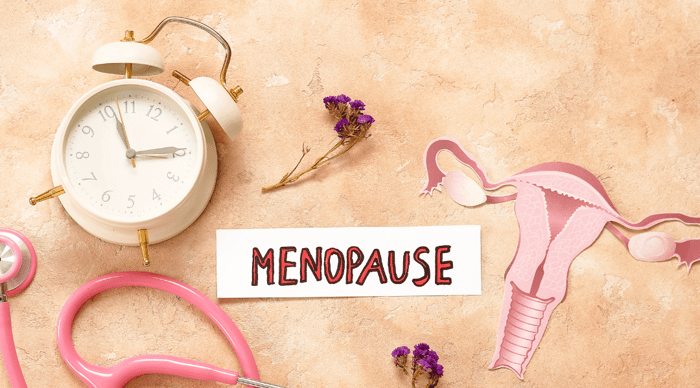Menopause isn’t just a phase. It’s a powerful transition. But let’s be real: it doesn’t always feel empowering when you’re waking up drenched in sweat, battling brain fog, or riding emotional waves that feel out of nowhere.
While hormonal changes are a natural part of this journey, the symptoms they trigger don’t have to be endured in silence - or without support.
Enter magnesium, a quiet but critical mineral that your body desperately needs right now. From mood swings to muscle cramps, magnesium plays a starring role in smoothing out menopause’s rough edges. And yet, most women don’t get nearly enough.
Here’s why magnesium deserves a permanent spot in your menopause wellness toolkit and how to get more of it starting today.
1. The Mood-Mineral Connection
As oestrogen declines during menopause, it impacts neurotransmitters like serotonin and GABA, which regulate mood and calm [1]. Magnesium helps support the production and function of both, making it a powerful ally for managing anxiety, irritability, and mood swings.
In fact, low magnesium levels have been directly linked to an increased risk of depression, especially in women over 40 [2].
2. Better Sleep, Naturally
Insomnia and restless nights are some of the most common (and frustrating) menopause symptoms. Magnesium supports melatonin production and activates the parasympathetic nervous system, which helps your body relax and unwind [3].
In particular, magnesium is known for promoting more calm and deeper sleep without grogginess.
3. Muscle and Joint Support
If you’ve started feeling tighter, stiffer, or more prone to cramps and tension, you’re not imagining it. Magnesium regulates muscle and nerve function, helping to ease cramping, body aches, and even migraines that can increase during menopause due to fluctuating hormone levels [4].
Bonus: It also supports bone health, especially important as oestrogen drops and bone density naturally begins to decline.
4. Blood Sugar and Weight Balance
Midlife weight gain isn’t just about metabolism - it’s also about insulin sensitivity, which often decreases during menopause. Magnesium plays a role in regulating insulin and blood sugar levels, helping reduce sugar cravings, energy crashes, and stubborn belly fat [5].
Think of magnesium as your metabolic wing woman.
5. Why You Might Be Deficient Without Knowing It
Even with a healthy diet, most women don’t meet the daily recommended intake of magnesium. Why? Because:
-
Modern farming practices deplete soil (and food) of magnesium
-
Stress, caffeine, and alcohol all increase magnesium loss
-
Common medications like PPIs and diuretics can block absorption [6]
So, even if you’re eating greens and nuts, your body may need more support.
How to Replenish Magnesium
Magnesium-rich foods include:
-
Dark leafy greens
-
Pumpkin seeds
-
Cacao
-
Avocados
-
Black beans
For therapeutic support, many women benefit from supplementation. Magnesium glycinate is ideal for mood and sleep; citrate supports digestion; and magnesium malate can help with muscle pain and fatigue, magnesium oxide is clinically proven for brain and migraine support and elemental marine magnesium helps to increase total body stores (this is exactly why we created our powerful 5 in 1 magnesium complex).
Topical magnesium oil or Epsom salt baths are another great option - especially for those with cramps or tension-prone bodies.
The Bottom Line
Menopause doesn’t have to mean suffering. With the right tools, you can move through this transition feeling grounded, energised, and supported. Magnesium may be a small mineral, but it delivers big benefits where it matters most - your mood, your sleep, your hormones, and your sense of calm.
It’s not just a supplement. It’s essential self-care.
Call us on 02476363873 or email us at hello@madebydaily.com to discuss your questions with a member of our clinical team.
Enjoyed this guide? Now read…
Magnesium 101: Types, Benefits & How to Choose the Right One
Perimenopause or Just Tired? How to Spot the Subtle Signs
Sunshine Fatigue? 3 Supplements to Help You Recover Quicker
References
-
Eby GA, Eby KL. (2006). Rapid recovery from major depression using magnesium treatment. Med Hypotheses.
-
Tarleton EK, et al. (2017). Magnesium intake and depression in adults. PLoS One.
-
Abbasi B, et al. (2012). The effect of magnesium supplementation on insomnia in elderly. J Res Med Sci.
-
Nielsen FH. (2018). Magnesium deficiency and increased inflammation: current perspectives. J Inflamm Res.
-
Mooren FC, et al. (2011). Oral magnesium supplementation reduces insulin resistance in non-diabetic subjects. Diabetes Obes Metab.
-
Gröber U, et al. (2015). Magnesium in prevention and therapy. Nutrients.




